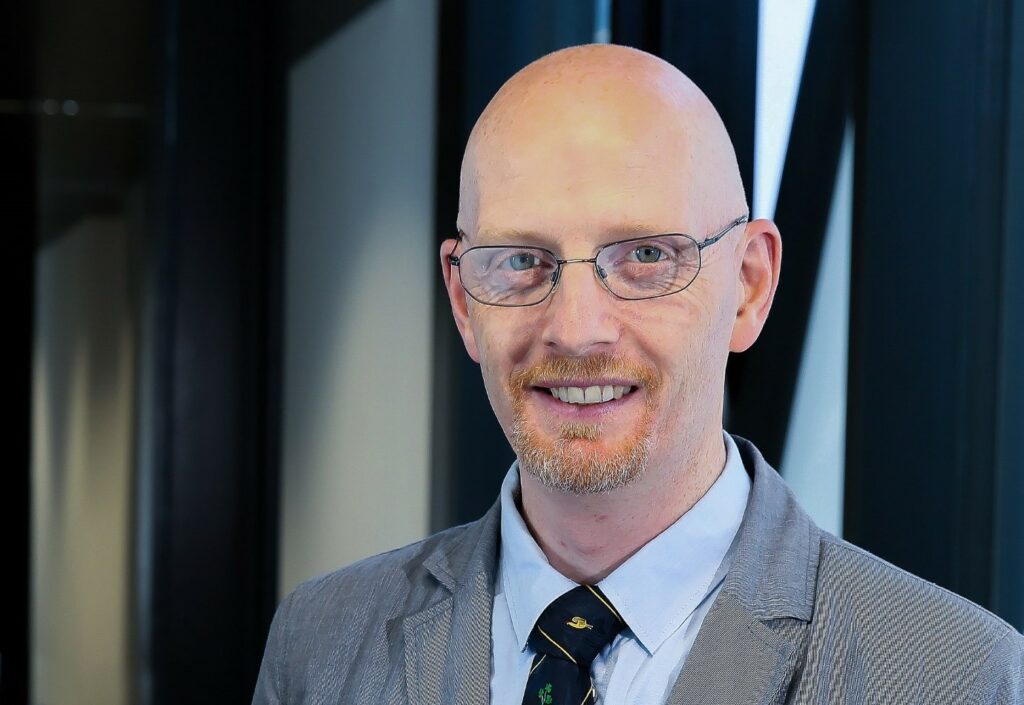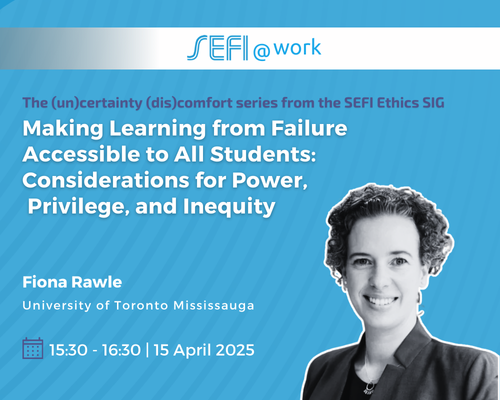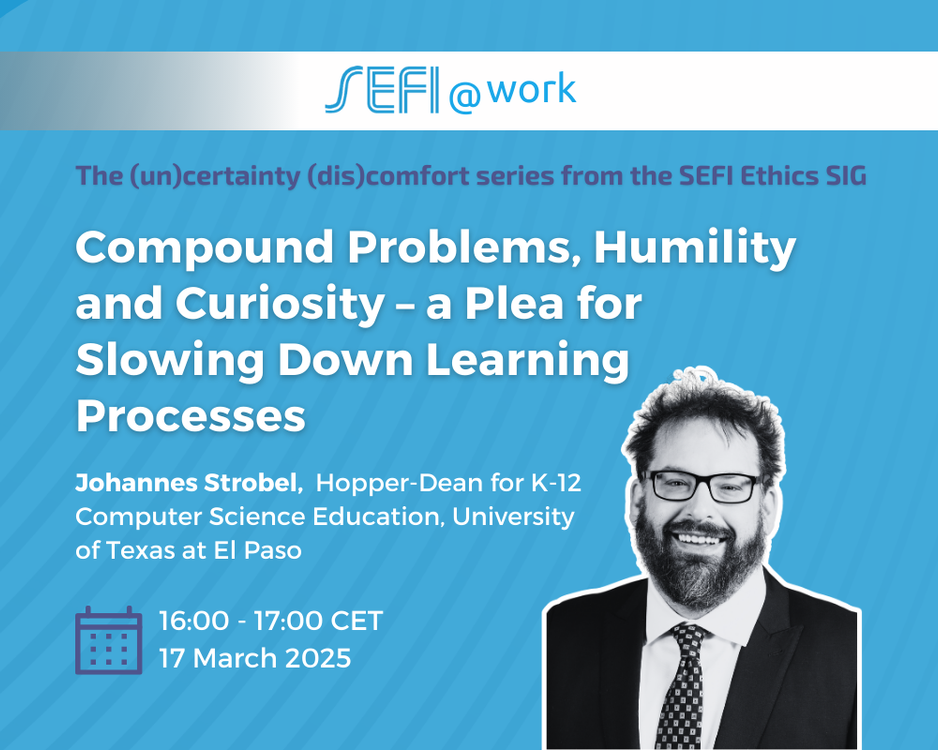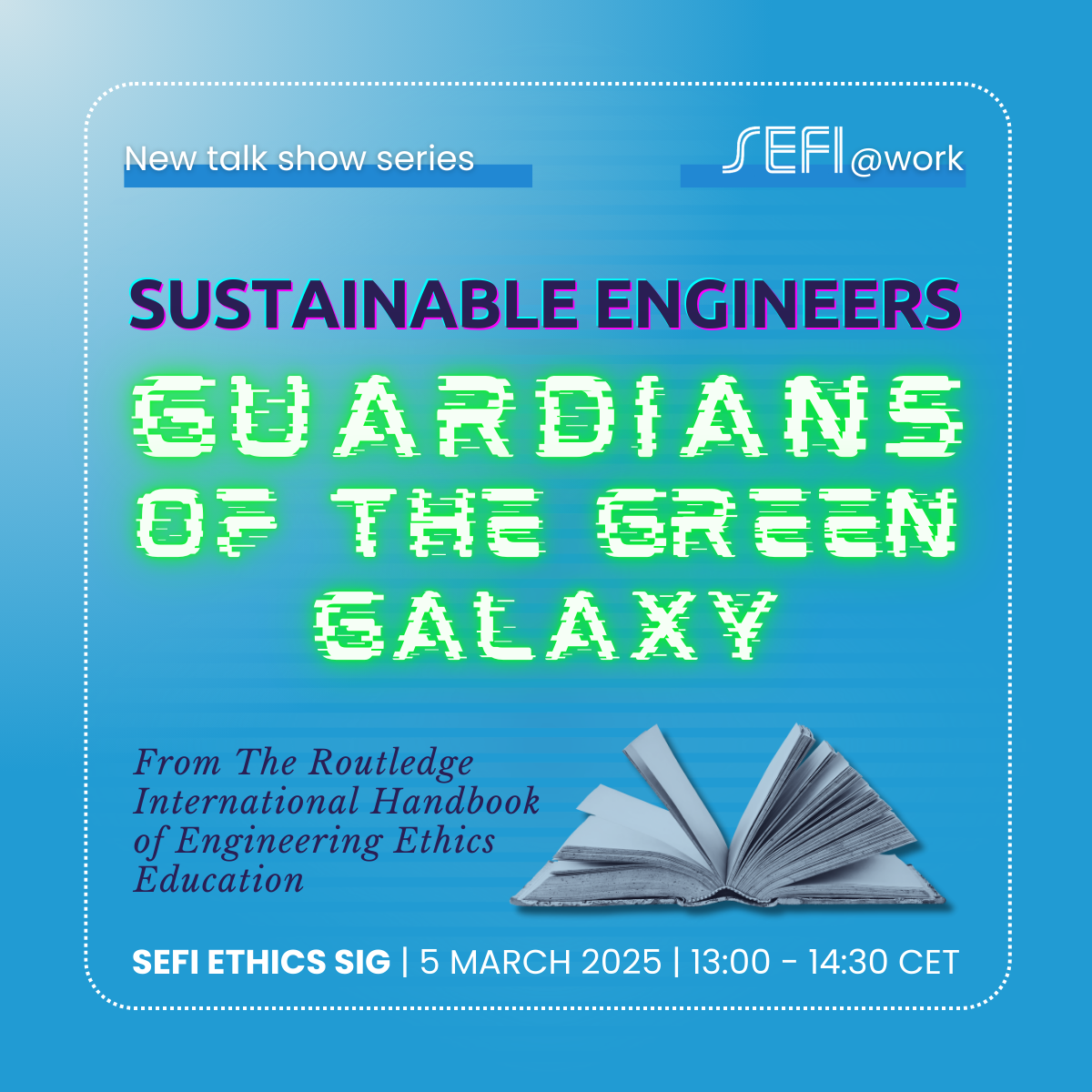15 April 2025, 15:30-16:30 CEST
This webinar will explore the impact that power, and privilege, and inequity play in one’s ability to embrace and learn from failure in the context of higher education.
European Engineering Educators podcast: season 1 episode 1:
Roland Tormey from EPFL discusses ethics with Neil Cooke and Natalie Wint
For our launch episode, our guest is Dr Roland Tormey, current co-chair of the SEFI Ethics Special Interest Group, and a senior scientist in the College of Humanities at École Polytechnique Féderale Lausanne (EPFL) in Switzerland. Roland’s training as a sociologist has provided the basis for his work into both emotion and inter-cultural education, and his pioneering research in teacher training and engineering ethics is changing how we think about engineering education.

Drawing on his work into the formal and hidden curricula of ethics in engineering education, he stresses the importance of ensuring that we teach ethics in a way that makes it relevant to engineers, and defines four elements which combine to give rise to ethical behaviour. He takes the view that our standard approach to teach moral reasoning using classic case studies don’t go far enough. Indeed, he argues that examples must be carefully selected, and that we need a greater emphasis on emotional intelligence and awareness.
Link to the podcast:
https://shows.acast.com/european-engineering-educators/1-roland-tormey-from-epfl-discusses-ethics
Background
Historically, engineering has been associated with ideologies of depoliticization (the belief that engineering can and should be done independent of political concerns) (Cech, 2013) and technical-social dualism (cognitive separation of ‘technical’ and ‘social’ competencies which devalues “social” competencies, such as those related to public welfare) (Faulkner, 2007). As such, it is unsurprising that it is only in the last few decades that the view of engineering as being morally neutral (Roeser, 2012), has been called into question.
Of course, the inextricable relationship between engineering and the society means that ethical behaviour has always been of paramount importance within the profession. However, it is only more recently, perhaps driven by the urgency of climate change and issues of sustainability, that the need to teach ethics to engineering students has been emphasised.
Today, ethics is included in accreditation criteria in several contexts including Australia, the USA, and Europe, and there has been a growth in research and professional networks which focus on the effective teaching of engineering ethics.
For the first episode of the European Engineering Educators podcast we spoke with Dr. Roland Tormey, the current co-chair of the SEFI Ethics Special Interest Group (SIG). Roland is currently a senior scientist in the College of Humanities at Ecole Polytechnique Federale Lousanne (EPFL) in Switzerland. Roland’s training in sociology means that he brings a different perspective to teaching engineering students about ethics and has provided a basis for his pioneering research into both emotion and inter-cultural education. Indeed, it is perhaps Roland’s work within teacher training that has shaped his pragmatic and practice orientated approach. The remainder of this article will summarise the key discussion points you may wish to reflect on after listening to the episode.
The role of ethics within the engineering curriculum
Roland encourages us to remember that we should not expect students to come into higher education with a developed approach to ethics and reminds us that there is a need to explicitly address ethical behaviour in all engineering programmes and in an integrated manner. Although Roland clearly values philosophical approaches to ethics, he cautioned against teaching it to engineers from a philosophical perspective which may lead them to thing that it is ‘not their problem’.
Frameworks and Theories
Roland leans upon the discipline of psychology and makes use of the Minnesota approach as a way by which to understand how individuals come to act ethically (Rest, 1994). The model defines three stages of moral reasoning: the pre-conventional stage (whereby decisions are made based on fear of punishment of desire for reward); the conventional stage (whereby decisions are made based on norms, codes and conventions; and the post-conventional stage (whereby decisions are based upon critical evaluation of the situation). Previous research has shown that, contrary to other disciplines, within engineering, students typically develop through the post-conventional stage at a slow rate (Borenstein, Drake, Kirkman and Swann, 2010). Roland argues that this is not because of some inherent difference between engineering students and other students, but rather it is because of the difference in the way that engineering educators teach, and the adoption of an epistemology that is based on the application of known or agreed principles. This, alongside the competitive and individualistic nature of engineering, Roland argues, is not conducive to the discussion of open-ended problems.
At this point it is important to remember that although our discussion focused on moral reasoning, there are three other elements with which it is combined to give rise to ethical behaviour (Rest, 1994), these being moral sensitivity, motivation to act morally and character to withstand external pressure. Thus, it is not necessarily true that having higher or lower levels of moral reasoning makes someone a more or less ethical person.
The role of emotions
Given Roland’s background it is hardly surprising that we spent some of the time talking about the role of emotions when making ethical decisions. Although emotion has previously been associated with bias in decision making, Roland claims that emotion plays an important role in sensitizing us to ethical issues, providing motivation to act, and potentially in facilitating certain types thinking. He posits that the role of the educator is to help students to become emotionally aware.
What about case studies?
Case studies are generally accepted as the predominant method by which to teach ethics, with Colby and Sullivan (2008) arguing that case studies constitute the most prevalent means of teaching engineering ethics in the US. Whilst Roland appreciates the role of the case study, he highlights the variability in quality and warns that the use of certain types of case studies can result in strong emotion, disengagement, and reduced learning gains. Some are also designed in a way that discourages moral reasoning. My own experience in facilitating ethics seminars has taught me that it can be challenging to encourage conversation about pre-defined case studies, such as Challenger and Deep-Water Horizon, which has such devasting consequences, and for which the outcome is already known!
Can we assess ethics?
Roland reminds us that assessment of teaching is as important of assessing the understanding of students, and whilst he would not use them for grading students, recommends tools such as the Engineering and Science Issues Test (ESIT) which has been developed to assess a person’s level of moral reasoning (Borenstein, Drake, Kirkman and Swann, 2010)
The work upon which the discussion was based can be found at:
https://www.sefi.be/wp-content/uploads/2017/09/56039-R.-TORMEY.pdf
The podcast episode is here:
https://shows.acast.com/european-engineering-educators/1-roland-tormey-from-epfl-discusses-ethics
References
Borenstein, J. Drake, M.J., Kirkman, R. Swann, J.L. 2010. “The Engineering and Science Issues Test (ESIT): A Discipline-Specific Approach to Assessing Moral Judgment”, Science and Engineering Ethics, 16, 387-407
Cech, Erin A. 2013. “The (Mis)Framing of Social Justice: Why Meritocracy and Depoliticization Hinder Engineers’ Ability to Think About Social Injustices.” In Engineering Education for Social Justice: Critical Explorations and Opportunities, edited by Juan Lucena, 67-84. New York: Springer.
Colby, A., Sullivan, W.M. 2008. “Ethics Teaching in Undergraduate Engineering Education”, Journal of Engineering Education, 97(3), 327-338.
Faulkner, Wendy. 2007. “Nuts and Bolts and People: Gender Troubled Identities.” Social Studies of Science, 37(3), 331-356.
Rest, J. R. (1994). Background: Theory and research. In J. R. Rest & D. Narvaez(Eds.), Moral development in the professions: Psychology and applied ethics, (pp. 1–25).Hillsdale, NJ: Lawrence Erlbaum; Rest, J. R. (1986). Moral development: Advances inresearch and theory. New York: Praeger.
Rest, J. Narvaez, D., Bebeau, M.J., Thoma, S.J. 2009 Postconventional moral thinking, a neo-Kohlbergian approach. Lawrence Erlbaum, Mahwah, NJ.
Roser, S. 2012. “Emotional engineers: Toward morally responsible design.” Science and Engineering Ethics, 18(1), 103-115.


